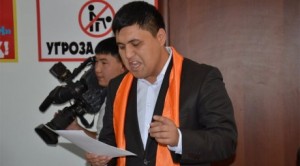Members of the Bolashak national movement and social activists in Almaty, Kazakhstan’s largest city, have combined their efforts to help staunch the spread of gay propaganda as well as ban same-sex couples from adoption, work in the public sector or service in the Kazakh army. Dauren Babamuratov, the public face of the anti-gay backlash, has warned of growing “pressure” from LGBT groups over the last several years, although he declined to elaborate specifically what those pressures were or how his proposals would address such things.
To the outside world, Kazakhstan may look like a country ripe for measures to address perceived anti-gay hysteria. A massive landlocked country in Central Asia (the world’s largest and larger than Western Europe), Kazakhstan was the last of the former Soviet republics to declare independence and still maintains many cultural and historical ties with Russia. Most of the country’s population lives in rural areas, descendants of nomadic tribes with little exposure to the outside world.
But this transcontinental country of only 17 million people is rich in natural resources and serves as a conduit between Western and Asian commerce. It has been granted U.S. trade status by the U.S. Department of Congress, has an aggressive educational program for its youth to travel abroad to help promulgate Western ideas back home and has been a beacon of economic growth over the last 10 years – minus a dip during the beginning of the Great Recession – which has attracted millions in investment from outside financiers that see Kazakhstan as a stable, educated and viable nation with a bright future.

But to Dauren Babamuratov, the threats posed by the LGBT community are grave. “Unconfirmed reports suggest there are about 14 gay clubs and bars in Almaty – the nation’s largest city and former capitol – which has effectively made Almaty the gay capital of Central Asia with open discussion[s] of the issues related to the LGBT community [which are] treated by the society as a natural process.”
The chief speaker has reminded lawmakers about the scandal over the now infamous ad poster depicting a local version of the world famous gay smooch, this one between two historical figures, one Kazakh, the other Russian. The poster caused quite a stir among Kazakhstanis and several political figures even slammed it publicly. A lawsuit was filed against the poster creators. “We have stooped so low that LGBTs no longer hide their orientation. One can see a lot of people in the city’s malls and other public places — these are young people in colored pants. This means they no longer hide their (sexual) orientation. I think it is very easy to identify a gay person by his or her DNA. A blood test can show the presence of degeneratism in a person,” the leader of the Kazakh national movement said.
“Unfortunately, suppressing activities of the LGBT community in Kazakhstan is extremely difficult, because there is no law in our country prohibiting this type of activity, that is, the promotion of homosexuality,” he concluded in a speech before the Kazakh parliament. Activists believe that the law should prescribe rules prohibiting sexual minorities from conducting the “outreach” work in public places.
Predictions of change to the marriage and family code, which would regulate such transgressions, are hard to make and the fate of the LGBT community remains uncertain but, by no means, final.











